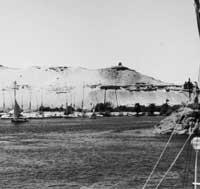The Nile as a precursor to the disaster?
According to Egyptian scientist Mustafa Abdu, misuse of the waters of the Nile River is endangering the lives of millions of people in inadequate irrigation projects. It highlights three main problems.
First, the change in flow caused by the hydrological engineering works carried out between Al-Khartum and Alkairo can damage the fertile plains of northern Sudan.

Second, the Jonglei Canal in southern Sudan, with the aim of increasing the flow of water to the north of Sudan and Egypt, can alter the riverbed and sink the fertile land. At this time, the project developed between Sudan and Egypt is paralyzed by the Sudanese civil war. According to Abdu, if the project was carried out, the drying of the marshes, the reduction of fish stocks and the degradation of the forest and other natural means would be carried out forever.
“If the As-Nose marshes are dried up, in neighboring States, Uganda, Ethiopia and Tantzania, the rain will decrease and the dry regions of Sudan and other States of the Nile basin could contribute to desertification,” says Dr. Abdu.
The third problem may be due to the Asuan dam. The dam prevents sediments and fertilizers carrying the river from reaching Lower Egypt. As a result, local agricultural productivity has decreased on one side and, on the other, the surface of the Nile delta has decreased. However, Dr. Abdu insists on another danger: The significant increase in Egyptian underground waters, which can soften the land. This can cause large slides.
Finally, the Egyptian scientist has pointed out that the wrong use of water can be a source of political conflicts in the future.





